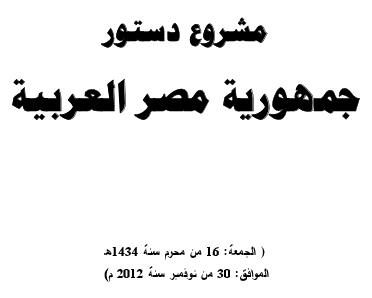
[Editor’s Note: The following commentary is a post originally submitted to the Sociology of Islam listserv about the current debate over the proposed new Egyptian constitution. There has been an active discussion of the pros and cons of the constitution, both in Egypt and among academics abroad, as evidenced in Dr. Bamyeh’s comments.]
by Dr. Mohammed Bamyeh
I think we have been constantly losing track of, or at least are not sure about, the right question to ask. For me, the primary question has always been: what ordinary Egyptians wanted? I know that “ordinary” is a construct, but there are ways to either measure that when you can, or at least sense with reasonable evidence where the prevailing sentiments may be heading. The revolution was made by those “ordinary people,” not by professional “revolutionaries.” It would never have succeeded any other way. But within the revolution there has always been a hardcore self-identified “revolutionary camp” (which in fact was the minority) that had an inflated sense of self-importance, and thus a propensity to be easily and deeply frustrated when it did not get its way (beginning with the March 19, 2011 referendum). Out of that they developed a strong suspicion of ordinary Egyptians, but outwardly that suspicion appeared as a strong resentment of what to them appeared as a monolith called the Brotherhood. The fact that they did not afterwards hesitate to use the Supreme Constitutional Court, that bastion of the counter-revolution, as their main weapon against popular will, and do so precisely in the name of the revolution(!) is simply shameless.
The fact that they did not want to accept was that the Ikhwan won not because of any manipulation, nor because of a deal with the military, but simply because they deserved to win. I am certainly not an Islamist–in fact I would describe my political leanings as anarchist. However, the real question for me is not one of ideology, but of sociology. The force that will have most resonance after the fall of a dictatorship would naturally be one that is most organically embedded in the deep, deep fabric of society, that exists in every Egyptian village, that for more than 80 years has been doing what ordinary Egyptians have felt to be useful, practical, everyday, non-revolutionary work–mostly. In contrast, what have the leftists/secularist/liberals ever done other than issuing pamphlets and grand declarations? What have they ever done for anyone, so as to cultivate the conviction that they should be the natural leaders of a society in which they had little roots and to which they spoke as vanguardist strangers–and before the revolution, often with contempt?
Obviously, constitutional drafting processes ought to be inclusive and consensual, and not simply governed by majority will. But if we look at the process, one striking feature is that the Islamist forces saw themselves as constantly giving concessions that remained unacknowledged by the other camp, and confronting a strange liberal position that seemed to say that whatever the majority wants, especially if it concerned a conservative traditional position, should be rejected in favor of a liberal position, even if the former was that of the majority and the latter is that of a minority. The lack of trust, I think, was intensified amidst that communicative dynamic, but it was already rooted in the liberal camp’s confidence that, especially after the dissolution of the parliament, that it could always rely on old courts to undermine the Brothers.
So gradually, The self-identified “revolutionaries” and remnants of the old regime saw each other to have now a common cause, and el-Baradei & Ahmad al-Zind joined hands. Is this a pretty sight? In this context the Brothers, who did not start the revolution, came increasingly to see themselves as its only guarantee of success. The fact that in this context the courts were taken out of the equation is precisely because they have become part of this struggle and could not be trusted to be above it. As Marina Ottaway put it: “Islamists won elections, and the courts annulled them. Now Islamists are annulling the power of the courts.” And keep in mind that the same court that annulled clear popular will on the basis of a technicality, did nothing against Mubarak’s last parliament that was elected with the most brazen fraud in modern history. I am not defending Morsi here, but asking this question: Is this the kind of court that should be trusted with any authority over a revolutionary era?
I think a significant number of “ordinary” Egyptians, perhaps a clear majority, see it now that way as well, because, after all, the revolution of ordinary people is typically governed according to a conservatively pragmatic logic. Also for that reason I do not think that blanket denunciations of “neoliberalism” have much track in society at large, even though they may make sense in some academic or small activist circles. But “ordinary” people do not talk about “neoliberalism.” They may instead talk about something more basic that they generically call “social justice.” And to their credit, the Ikhwan have developed rootedness in society precisely due to their ability to use that ordinary language of justice, the same language that ordinary people use. They do not use strange sounding concepts, nor insist that they would talk to people only after they have learned, and accepted, that neologism as describing their real problem.
Dr. Mohammed Bamyeh is Professor of Sociology at the University of Pittsburgh and editor of the International Sociology Review of Books (ISRB)